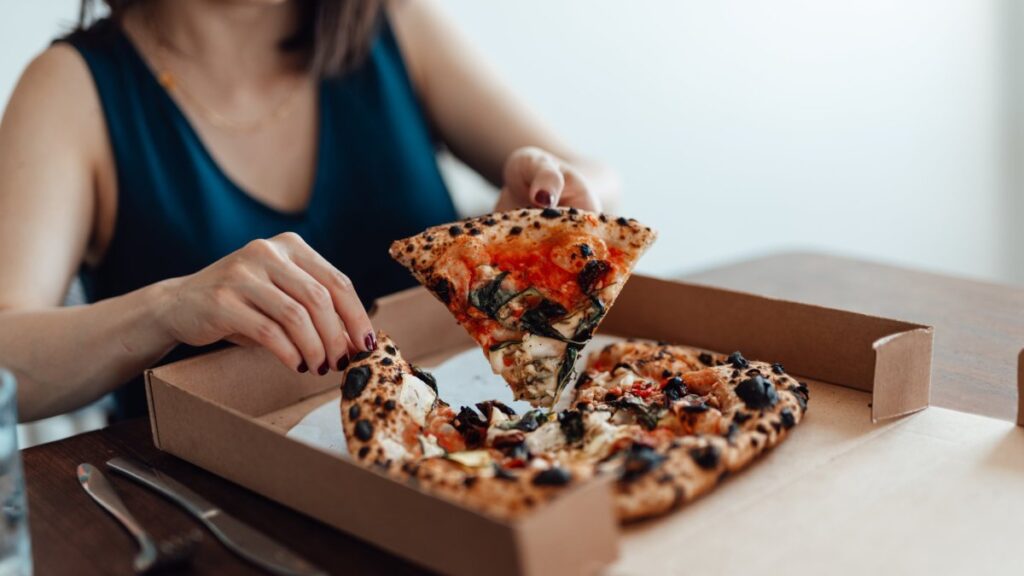Look up the phrase “emotional eating” and dozens of articles telling you how to stop doing it will appear. Emotional eating – defined as eating in response to a negative emotion – is seen as synonymous with unhealthy eating. But Pixie Turner, nutrition counsellor, psychotherapist, and author of a book, Food Therapy, believes that the idea of emotional eating has been much maligned and misunderstood.
In her experience, it’s too simplistic to say that eating because of our feelings is an issue in itself. “To be an emotional eater is to be human,” she says. “Eating in a purely functional way, in order to stay alive, is not the way most people eat, and I don’t think it’s the way that we should eat either. It feels like such a shame to take pleasure away from food when we’ve literally evolved as humans to enjoy food.
“People have this idea that emotional eating is something that is wrong, that it is always overeating, always out of control, and is always something inherently negative,” says Turner, “and in research it’s described often as a dysregulated response to emotions, but I definitely do not see it that way.”
Turner knows personally, as well as professionally, the harm that restricted dieting and shame around food can do. Before she became a registered nutritionist, Turner developed orthorexia: at the age of 20 she stopped herself from eating meat, fish, dairy, eggs, soy or refined sugar as part of an “extreme clean eating” disorder.
She has since recovered, and in 2016 she apologised to those to whom she spread the “clean eating” message on social media, retraining as a nutritionist and psychotherapist to help people have better relationships with food.
“At times emotional eating can certainly be unhelpful but it can also be wonderful in that food is able to soothe, and to provide comfort, warmth and security,” says Turner. She points to the fact that we eat in response to lots of emotions – positive ones, too. “We tend to eat when we’re happy and celebrating with someone, and that this is a form of emotional eating, and part of food culture.”
 Pixie Turner, psychotherapist and nutrition counsellor, says it’s important to examine the emotions that are driving comfort eating
Pixie Turner, psychotherapist and nutrition counsellor, says it’s important to examine the emotions that are driving comfort eating
Conversely, if we’re feeling sad after a break-up we may want to eat lots of ice cream, or if we’re stressed we want pizza. “That can be useful in getting you through the evening and helping you move on to the next thing,” says Turner.
“Comfort eating can be wonderful in lots of ways, like when we use it to ease our feelings of loss or longing for a person or place. When you feel that sadness and there is a particular food that reminds you of it, or them, and when you cook it it brings you closer to that somebody.
“I had a client for whom canned potatoes reminded her of her grandmother who passed away and every time she ate them, she felt some comfort and felt closer to her. Now that is comfort eating. How can you tell me that that is wrong? In this case, the emotion is longing, you eat the food and the emotion fades a little.”
The point when emotional eating can become harmful, says Turner, is if one relies on food to cope with every emotion. “The problem is not the food, the problem is that we’re avoiding the emotions behind it,” she says. “Why are we simply labelling this as bad without attempting to understand why it happens in the first place?”
She argues that this is no different from using alcohol, drugs, cleaning, work or exercise as a distraction or suppression tool. “We have to address the emotions that lead to the eating, to see if there might be another way to express or deal with those feelings,” she says.
“Because your brain uses food as a coping mechanism because it is trying to help you, not harm you. Food is not the problem. Food is an attempted solution to an underlying problem, so we need to figure out the cause of this relationship breakdown, not just treat the symptoms”.
Signs of unhelpful emotional eating
Spending a lot of time checking food labels
Rigid rituals and routines surrounding food and exercise
Feelings of guilt and shame associated with eating
Preoccupation with food, weight and body image that negatively impacts quality of life
A feeling of loss of control around food
Using exercise, food restriction, fasting or purging to ‘make up for’ eating certain foods
Food dictating how good/bad you feel about yourself that day
Turner remembers a client had a father who was aggressive, not physically violent, but prone to fits of rage. “This client grew to be quite fearful of anger, because his only understanding of anger was rage. So whenever he would feel angry, he would then immediately go and get food and eat it to try and push that anger down. If we’d talked about emotional eating just generally without exploring the underlying reason for him having such a fear of anger, we would have missed the point.”
So once you’ve worked out the emotion driving you to eat, what happens next? “We helped him understand that he was not the same person as his father, to help him practise expressing anger without rage, safely, without hurting himself or anyone else, and also to help him process those emotions.”
More on Features
In cases like this, Turner recommends replacing eating with another soothing activity. “For anger, it tends to be something more kinetic that involves the body, like exercise, or I’m a big fan of the guttural primal scream, especially for women. Just a good, solid sound. I do it at home, it’s great. It doesn’t need to be loud, just solid.
“For sadness, a very common one, I might recommend eating something while you are listening to music that can make you cry, so you get that release from the tears as well. Or journalling first, before eating, and seeing whether that helps with the emotion. If not, you can absolutely turn to food.”
Turner believes that if food is a crutch, or a tool that helps someone, there’s little point taking that away. Instead it’s about adding other ways of coping or processing the feelings.
“Ultimately, I don’t believe in ‘fixing’ emotional eating by resolving to never eat when we’re stressed, or bored, or angry, or sad or lonely. I don’t believe that disordered and restrictive eating can be resolved without looking deeper into the reasons why we got here. That’s far too black-and-white a way to look at something as fundamental and wonderful as food, and the role it can play in our lives.”
Pixie Turner’s Food Therapy is out now (Hachette UK)
How to work out your own emotional eating habits
The crucial questions Turner asks her clients, and anyone who feels their emotional eating is detrimental to them; “Which emotions lead you to eat? What are your assumptions, ideas, the lessons you’ve learnt in life about those emotions?”
Learn to recognise your own hunger, so you can figure out whether you’re hungry, or eating to cope with an emotion. If the latter, spend five minutes working out exactly what you’re feeling, and spend a bit of time with it.
It might be uncomfortable, and if so, good! It’s not supposed to feel comfortable. It doesn’t mean you then shouldn’t eat something, it’s just about also processing the emotion and understanding it.

